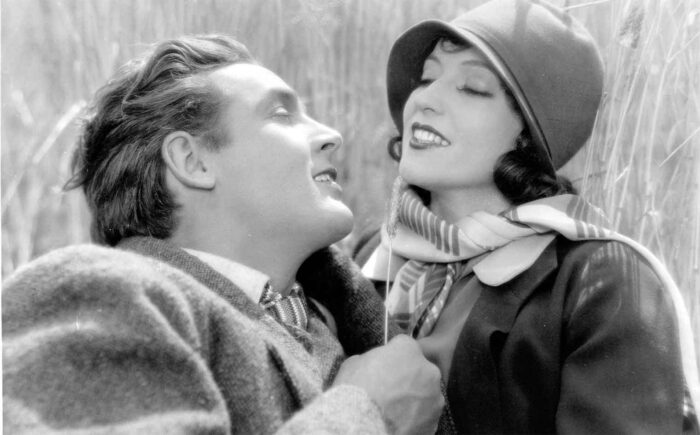Although the second-to-last film of the German master director F. W. Murnau (1888-1931) is too often left in the shadow of the more famous and similar Sunrise: A Song of Two Humans (1927), it does not in any way lose out to its predecessor where it counts.
The story, which in its directness strives for almost soulful purity, is deceptively simple. Kate, a Chicago waitress yearning to escape the city, is played by Mary Duncan (a more erotic Janet Gaynor). She falls in love with a young farmer, Lem, played by Charles Farrell (a more feminine George O’Brien), who has been sent by his strict father to sell farm crops. As the couple falls in love, a swift marriage takes them to the care of Lem’s parents on the family wheat farm, but the conservative patriarch (David Torrence) sees his new daughter-in-law as nothing but a gold digger, and the son does not want to openly oppose his father. More problems arise when striking workmen begin to court the beautiful new arrival, the price of grain plummets due to the stock market, and the crops are in danger due to a hurricane.
There was never any doubt that Murnau was highly regarded in his time, and many came to take private study excursions to the UFA studio in Neubabelsberg. Among such visitors were one Alfred Hitchcock, who came to see the filming of The Last Laugh (1924), and John Ford, who spent a month in Berlin in 1927, and – uncharacteristically – even publicly proclaimed himself to be a true fan.
The latter might very well have had in mind City Girl’s main couple, their marital issues, and Kate’s refusal to participate in violence as she locks the bedroom door in Lem’s face, when, in The Quiet Man (1952), Mary Kate Danaher deals with her man Sean Thorton in a similarly pacifist fashion. Murnau’s harvest and labor sequences, on the other hand, are brewing with the spirit of Soviet kolkhoz poetry – King Vidor revisited the theme in his work Our Daily Bread (1934), and Terrence Malick has acknowledged City Girl as the foremost inspiration for Days of Heaven (1978).
Among his colleagues Murnau is most like the more romantic and optimistic Frank Borzage, who would bring his lovers together even if by means of eternity. The German’s conception of love is more sullen and less obvious; even the ending of City Girl was supposed to be considerably darker, but film studio involvement from Fox limited the artist’s creative freedom. Due to disputes during the film-making process, Murnau walked away from the project and was not involved in the final cut, and comedic elements and poorly synchronised sound were added at the behest of the producers. According to Lotte Eisner, the juxtaposition striven for by the director, of the cramped city and the vast expanse of the wheat fields, is left barely perceptible. The original vision for the film was for it to be “a story about the holiness of bread,” suggested also by the working title “Our Daily Bread”. Nonetheless, despite much mangling, the auteur’s touch remains in the details, the nuances and the small unspoken gestures and insights.
Like its predecessor Sunrise: A Song of Two Humans, City Girl is a moonlit “story about two people.” To Murnau, “creating shadows was always more important than light,” – this hearkens back to Thomas Mann’s old remark that “tragedy and comedy sprout from the same tree, and a mere change of light is enough to transform one into the other.” Murnau’s City Girl, a modern story disguised as a classical one, challenges both traditional gender roles and the biblical notion of “respecting thy elders.” As adversities line up, Murnau’s lovers battle them in the name of love. It is their duty, and in the end, all that remains is a new morning marked by eternal return.
The Midnight Summer Festival’s Friday night culminates in City Girl, accompanied by the pianist Neil Brand, who has experience spanning four decades in the music of silent films, and the washboard- and banjo-equipped Dodge Brothers, who specialise in Americana-tinged bluegrass.
Lauri Timonen
